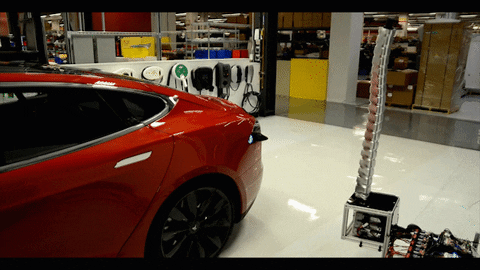|
|
With so many dollars pouring into the EV market, should a climate-conscious citizen make the switch to electric vehicles?
GM announced its development of an electric Hummer last year. The notorious gas guzzler will operate on bolts and volts, with a 350+ mile range and other cool tech-enabled features. The new truck will rival the upcoming Tesla Cybertruck when it goes on sale in 2023 for a whopping $110,000.
It is hard to ignore solar’s upward trend in energy markets. As marketing for renewable-powered machines shift toward mainstream buyers, combustion engine vehicles may fade of fashion.
That transition may be take years to manifest. Either way, the EV market is booming.
Busy? Try the speed read.
Big picture: GM announced plans to release an electric Hummer in 2023. It got me thinking, is it time to make the switch to electric vehicles?
Benefit of electric vehicles:
- Lower carbon footprint… social impact ✓
- Lower maintenance costs… convenience factor ✓
- Tax credits… financial incentive ✓
Cost of electric vehicles:
- EVs require minerals like cobalt and lithium to function. Mineral mining is a tough industry with poor standards in developing countries like Bolivia and Chile. Organizations are working to change that.
- Electric vehicles have a limited driving range compared to their gas cousins. You may find yourself charging up more than usual.
- High sticker prices: The average price of a new electric vehicle is almost double the price of a gas car.
- Limited amount of charging stations: this is a tricky one, because there are still more charging stations per EV on the road than there are gas stations for gas cars. Unless you go on a road trip, most of your charging will probably be at home anyway.
Bottom line: With billions of dollars flowing in, electric vehicles are not only here to stay, they are booming.
If you 1) need a car in your life 2) want to be a part of a cleaner future and 3) can afford the extra monthly cost (for now), then making a switch to electric vehicles is the right thing to do.
Dig deeper ➝ 3 min
Benefit of electric vehicles
-
Lower carbon footprint
-
EVs generate approximately 50% fewer greenhouse gas emissions over the life of the vehicle than internal combustion engines, and perform even better in areas with higher availability of renewable energy.
-
-
Lower maintenance/running costs
-
Without an engine that requires oil, EVs operate without those annoying oil changes, or other checkups and repairs that come with a gas-powered vehicle.
EVs may cost more upfront, but the cost may offset if you factor in your gas bill, oil change, etc.
-
-
Tax credits available
-
Check if your state does tax credits for electric vehicles. You can save as much as $7500 in taxes depending on where you live.
-
Cost of electric vehicles
-
Mineral mining
-
The demand for EV batteries will spike the demand for minerals like cobalt and lithium. These resources can be found in areas of the world like Bolivia, Chile and the Democratic Republic of Congo.
Mineral extraction is a tricky business, and can potentially lead to other environmental and human-rights violations.
-
-
Limited driving range
-
No, not the golf kind. As mentioned, GM’s new Hummer model will have a 350-mile range, which is considerably high.
The 2021 Hyundai Kona EV, for example, has a 258-mile range. Its fossil-fuel counterpart, the Hyundai Tucson, has a 459.2 mile range.
-
-
High price points
-
In 2019, the average cost of a new car was $34,500. By comparison, a new electric car averaged $55,600, according to Quartz.
Keep in mind, that number decreased from $64,300 the year before. The average cost of all new cars increased by 2%.
-
-
Spotty charging infrastructure
-
There are about 10,000 electric charging stations, compared to 150,000 gas stations.
Still yet, there is a higher ratio of charging stations to EVs then gas pumps to gas cars. And most charging will end up at home anyway.
As driving ranges continue to improve, and more infrastructure is built, this argument will fade.
-
Key talking points
Keep building more charging stations.

The U.S. Department of Energy has found that drivers with access to charging at work are 6X more likely to switch to electric.
As mentioned, most charging takes place at home anyway, but there seems to be a psychological association with the appearance of electric charging stations and the willingness to purchase electric cars.
Step-up supply chains.

In order to align well with sustainable development goals, battery and vehicle companies need to work with non-profits that encourage transparency and ethics around social impact in mineral producing countries.
Hold businesses accountable through profit/not-for-profit partnerships and regulation.
The Organization for Economic Co-operation and Development (OECD) and World Bank already push for higher standards in this space and more public investment in safe, efficient processes in mineral producer countries.
Likewise, the US State Department launched an Energy Governance and Capacity Initiative aimed at assisting mineral-abundant markets.
Electric vehicles will only get better.
Should you make the switch to electric vehicles?
The future is promising, but right now electric vehicles are not a perfect manifestation of sustainable consumer technology. The numbers don’t lie.
With that said, literally all major automakers… and governments… are betting on the EV market. Current setbacks associated with EVs, like limited access to charging stations or high sticker prices, will likely dissipate over the next decade.
If you want to get ahead of the curve and invest in a cleaner future, I’d recommend going electric today. But if you live in a major city with accessible grocery stores and public transportation, the best thing you can do is still biking/walking.













No Comments